
Frostbite.
The Frozen Surface is a dark and suspenseful northeastern revival mystery thriller. It is set in the desolate, melancholic northeastern suburbs of Harbin, Heilongjiang, a part of China known for its dastardly dry and freezing cold winters. The dialogue is mostly in Northeastern dialect, which I am not familiar with enough to comment on its authenticity. Despite its wild natural beauty, this area is among the slowest growing economic regions in China. The general lack of economic opportunity and the dominance of a largely industrial manufacturing base forms the general remote backdrop for this narrative. The timeline alternates between the 1990s which were very difficult times and 2005, when things are notably better but still a far cry from China's advanced coastal cities.The violent death of a crime boss and two others throws Lanhe County in disarray as various vested interests scramble to position for the fallout. There are almost too many suspects from a jilted lover, mob rivals, the nephew and heir apparent, the ex-wife and an ex-con; all with motive, means and opportunity. Police captain Guan Yu and his team investigates under time pressure to solve this high profile case. The waters are further muddied with an unexpected confession. Very much like 2023's hit The Long Season, the social commentary about the cruel times, hardships the main characters endure and the desperate, heartless and at times tragic choices they make eclipses the mystery itself.
This drama starts out very well but tries to do too many things. What anchors it is fantastic acting by Chen Jianbin (Guan Yu) and Hu Jin (Yang Si). I thoroughly enjoyed their cat and mouse and how a silent empathy developed between them. Even though some characters do bad things, I feel quite sorry for them. There are also a number of absolutely crazy, bloody and scarily violent maniacs in this drama that adds to the growing sense of dread as the plot builds to a climax. Unfortunately, the main villain's origin story isn't empathetic and they made too many bad decisions along the way to qualify as smart. Some plot points are too obvious or are revealed too early. The logic of many characters collapses into the final two episodes and the plot does not tie together tightly at the end. By then, both the director or scriptwriter's brain must have succumbed to frostbite because so many things just don't make sense or are not well explained.
This is a drama that starts slowly but builds up suspense quite well in the first half. The character stories are quite interesting but sad and they are well portrayed by veteran actors. Unfortunately the mystery part crashes at the end. As an avid mystery watcher, I can only rate this a 6.5/10.0. Viewers who are more interested in the setting and the character stories may rate it a bit higher.
Cet avis était-il utile?
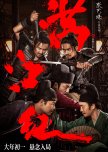
We will feast on the enemies flesh and drink their blood.
Full River Red is an ancient dark comedy whodunit set in Song dynasty. It is Zhang Yimou's most commercially successful movie to date That is no reason to dislike it. For Zhang Yimou never fails to stun with the sheer brilliance of his cinematic vision and his ability to provoke and capture profound human emotions. It is his narrative style that tends to be weighed down by illogical, at times exaggerated plot points and inconsistent characterisations that rarely does justice to his incisive camera language. While there are traces of these habits, this twisty, stab-happy mystery is the tightest plot I have seen from him in years.As much as the critical political and societal undertones of Zhang's earlier works discomfited the Chinese government, his recent works are now accused of pandering to government propaganda. Every Western film critic has remarked upon the movie's jingoist note with a sense of unease. The Chinese title Mǎnjiānghóng/满江红 or crimson river sets the tone from the start. This eponymous poem attributed to patriot Yue Fei is ubiquitous; it spoke to me even before I could understand its prose. People's hero Yue Fei was a revered Song general who relentlessly defended his homeland against the invading Jurchens. He was betrayed by the enemy within, a jianchen/奸臣 treacherous official Qin Hui who goes on to be prime minister. What happened to Yue Fei is one of history's terrible injustices, one that still resonates eight hundred years later. The common people appeased their deep sense of sorrow and thirst for justice by deep frying dough sticks in oil yóu zhá guǐ/油炸鬼 or deep fried guǐ/ 鬼 or devil, which in Cantonese is a homonym for Hui/Kuai/桧 in Qin Hui. When I was a kid, my dad used to rant about the dastardly Qin Hui every time we bit into his favorite crispy fried dough sticks.
The movie opens four years after the unjust death of Yue Fei. A Jin envoy is murdered on the eve of his meeting with Prime Minister Qin Hui. The important missive he carried is missing. The unfortunate night patrol is put under the knife as heads must roll for this diplomatic disaster. Desperate to buy time, corporal Zhang Da convinces Deputy Commander Sun Jun that he may be of value in solving the case. They make some small progress and are given two hours by Qin Hui himself to recover the missing missive. Thus begins a high-strung, knives drawn chase through the serpentine military compound as they question unreliable witnesses and fend off duplicitous officials vying to get their nefarious hands on the missing letter.
In a departure from Zhang Yimou's signature, bombastic color drenched cinematic style, the palette is muted, somber and haunting in its clean lines and simple, gorgeous grey toned soberness. There is a sense of profound gravitas that overhangs the thrill and suspense of unraveling the conspiracy at hand. The pacing is start stop as the narrative slows down enough to allow important plot points to soak in only to pick up again to the tune of a clattering amalgamation of hip-hop and Chinese folk music as they race through the complex to pin down the next clue. The body-count piles up as suspects are dispatched suddenly and brutally with dark humor that is as sharp as the knife play. I won't spoil the ending other than to say it is wildly, enormously satisfying and yet it still respects history.
In terms of the cast, it really doesn't get better than this. I was surprised by Shen Teng and Jackson Yi's chemistry and how humorously they convey just the right mix of conflict, mistrust and empathy. I must applaud both Lei Jiayin and Zhang Yi for taking on roles outside their comfort zone. I could see that Lei Jiayin absolutely relished playing the vilest most hated villain in Chinese history. While far from the monster of my childhood imagination, his Qin Hui is still a wicked, cunning creature but also realistic, mortal and even almost human. To me, the memorable highlight of the drama was to watch one of China's very best actors recite the titular poem. Yes it is a very patriotic poem but its message is universal - everyone loves their country for better or worse and will defend it with every ounce of their being. This is the one time that Zhang Yimou's famous digressions is actually fitting and gives a deeper meaning to the story. The movie's big message is also universal; that there are some truths that must be revealed at whatever cost.
This movie hits all the right buttons for me - a dark comedy conspiracy thriller with a touch of wild history around characters that set my imagination and sense of right and wrong afire as a child. It smacks of Zhang Yimou's hallmark provocative brilliance with small flaws and is one of the rare times I enjoyed his storytelling almost as much as his visual composition style. This is an 8.5/10.0 for me.
Full River Red (follows the toned down movie translation):
My last words reflect my thoughts
Full river red
My hair bristles with anger
I lean against the rail
The rain has stopped
Looking at the sky
I let out a cry
Emotions well up in my chest
My achievements in the past are merely dust
I fought bravely with the clouds and the moon
Don't wait
When your hair turns grey you can only regret
The national shame has not been avenged
When can my hatred be wiped away
Riding war chariots we will tumble the Helan Mountains
We will feast on the enemies flesh and drink their blood
When we recover our lost lands
We will satisfy people's demands
Cet avis était-il utile?

Death Proof.
This is a good but very dark comedy, one that I am pleasantly surprised to see in a Chinese production. Although with some modification, this is an obvious knock off of a fantastic but much darker Western production that many are likely to be familiar with. I don't have a huge problem with that and must applaud the effort to localise the story and tone it down for Chinese audiences. That said, it is an incredibly dark theme and at times the macabre gallows humor accentuates rather than distracts from the underlying despondency.Mi Chong is an introverted, anti-social young man who can just no longer be bothered to live. He meticulously winds up his affairs and plans his exit but is rudely interrupted by a drowning girl, Zhi Liao. Zhi Liao is his polar opposite, a bad-ass, extroverted and rebellious girl who is nothing but trouble. As he gets reluctantly drawn into her affairs, the hapless Mi Chong cannot seem to be able depart in peace; all of his efforts to do away with himself are comically disrupted. As he gets swept up in a whirlwind of danger and whacky mis-adventures that seem to plague Zhi Liao, he begins to wonder if he suddenly became death proof. While they go on the run together, this unlikely couple starts to recognise they are each other's mutual salvation. As their enemies encircle them, is the final irony that Mi Chong ends up fighting to save his life rather than end it?
Most of the time the whacky plot hits the right notes in terms of dark humor, irony and quirkiness. That said, there were also many times I found nothing funny about the depth of Mi Chong's despair and I am surprised something this dark got pass censorship. And I was not satisfied that Zhi Liao does not have the slightest inkling what Mi Chong was going through. It is a big flaw in the relationship design, the fact that she never comes to appreciate how disturbed he was. While the actress Vivienne Tien did a good job overall, she overacted notably in the ending arc and her rage and anger failed to move me. Although it became clear that they grew to trust and rely on each other, the chemistry between the couple didn't change enough to convince me that the dynamics turned romantic. The surrounding cast was unexceptional with some cringe performances, notably Zhi Liao's brother. This is clearly a modest production but overall a uniquely enjoyable, quirky short watch.
My rating for this is a 7.5 for a delightful attempt at dark comedy. It still has rough edges and the wit and humor in places veers too far off to the slapstick and does not match the wit, audacity and sheer magic of the drama it obviously drew its inspiration from. Where it does exceed it is that it closes with a very positive message about life, how it should be lived and how not to let the past define the future.
Cet avis était-il utile?

Today is a good day to die.
Xu Tian, the young scion of a wealthy Southeast Asian family, is on his way to Shanghai to meet his fiancee for the first time. Set in 1930, his journey takes him from Guangdong through Jiangxi and Zhejiang; lawless territory controlled by local warlords. This is a road drama where the journey is an analogy for Xu Tian's personal growth and how this perilous trip makes a man of him. He is aided and inspired by five eccentric jianghu characters - a hot-blooded revolutionary, an idealistic warlord in a gilded cage, a romantic gambler, a passive aggressive doctor and a bourgeois wheeler and dealer. As they cut a bloody path to Shanghai, Xu Tian learns that actions have consequences; to live in the moment; that luck can change; that family must be protected and that money can buy access to all sorts of people and things.This is the fist time I have seen a Chinese drama attempt this kind of bizarre, absurd and violent black comedy where a small event, in this case a purloined wallet spirals out of control and snowballs into a series of violent, unpredictible and bloody encounters. All of Xu Tian's companions along the way have distinctive personalities and temperaments that make them the main character in their own stories. They are wierd, flawed, obssessive characters that are at surface triggered by bizzare and seemingly trivial events that are actually profound and hopelessly romantic upon deeper reflection. When triggered, they become raging bloodthirsty lunatics with a "today is a good day to die" kind of reckless fearlessness and determination. The ethos and irony is captured and diffused by the crisp, darkly comedic dialogue that builds both anticipation and fear as the story careens down a volatile and unpredictible path.
This cast list is like the who's who of top Chinese actors, starting with Liao Fan as Lao Sun. His opening arc is the one that made me experience shock, awe, rage and sorrow at man's reckless, absurd, obstinacy and obsessiveness. This was a tough act to follow and Zhang Luyi fumbles a bit in his portrayal of Yu Yixiu, who is by design a fascinating paradoxically powerful and helpless character. Thus the second arc sags somewhat but gets shored up somewhat by Wu Xiaoliang's short and moving portrayal of the lovestruck gambling addict. The drama gallops on to a thrilling finish when Zhang Yi's obsequious, passive aggresive doctor teams up with Tian Yu's explosive, trigger happy capitalist for the final showdown. I also have much praise for Zhang Jingwei's fanatically dogged Ma Tianfang, Song Hanhuan's mercilessly ambitious Wu Da and Qiu Tian's passionately misguided Jia Ruo Lan.
Unfortunately the cast's impeccable performances all around is weighed down by the leading role, Dong Zijian's Xu Tian. He is an excellent actor but this was a big step down from his other works. Maybe he was simply out classed by the stellar cast but I think more likely, he was just mis-cast in this role. I didn't like his Xu Tian at all and was not moved by and did not empathize with the character. If the journey made him smarter or stronger, it did not come across; he just seemed just as belligerent, more vicious and just as obdurate. I frankly didn't care whether or not he made it to Shanghai and couldn't believe so many risked all to help him along the way. I even cared more for the petty villains and the poor bystanders that were collateral damage than I did for Xu Tian. This drama made me laugh as hard as I cried and I was unbecomingly thrilled by every dark, sick, ironic twist the narrative took. But when I can barely root for the main character over the villain, I must only rate this an 8.5/10.0. That said, it is still a mind-blowing and incredible adventure, especially if you like dark comedy.
Cet avis était-il utile?
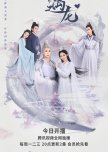
Which asshole wrote this script?
That was the best line in Miss the Dragon, a xianxia that just misses the boat. It is a thought that jumps to mind at various points of the drama. The writer must be someone with both self awareness and a sense of humor. Which you must have plenty of if you choose to watch this because it can be so ridiculous and silly that you almost have to just laugh at it.The story opens with the injured dragon king Yuchi Longyan rescued by a maid Liu Ying who mistakes him for a common snake. Liu Ying rescues injured animals, including the bird elf Qingqing while she daydreams about the mythical dragon king. The first arc is largely an amalgamation of the best moments of other hit xianxias, notably TMOPB. When it comes to recycling other drama's memorable moments, it best be either a really clever parody or a vastly superior moment. In this case it is neither. Some of the writer's own original humor is fresh and funny enough they should have just gone with that and focused on fleshing out the main couple and getting us invested in their relationship. Instead, after being vividly reminded of some old favorites, I am left with the impression of two rather blank characters whose shallow infatuation with each other was unlikely to last until supper time, forget several lifetimes.
While Liu Ying does get a tad more interesting with each subsequent lifetime, there is little of substance that survives each incarnation. So it is not clear what Yuchi Longyan is fighting for, what is innately so special about Liu Ying that the dragon king loves so much. Zhu Xudan did a good job essentially playing four different characters but she is wasted in these sappy rather simple roles that any newbie actress can play. As for Wang Hedi, after a delectable opening scene of him emerging scantily clad from the dragon pool, I was left with an indelible impression of an overdressed plank. His portrayal of the dragon king is an impressive study of the art of being bizarrely still and plank like while everything else is moving. At first, I thought he was accidentally sent the script from a botox commercial. Then I started to feel insecure about accidentally hitting pause on my remote. Bottom line, I didn't feel any spark between the leads. Oddly, his interactions with all of the other characters are so much more natural and enjoyable. I rarely comment on the OST and the BGM but in this case I must point out it was good enough to make me tear up much more than was induced by the acting or story during the sad moments.
The idea of a love that transcends lifetimes is very powerful and moving but that concept is much more originally and engagingly explored in the second couple's story. Indeed the love story between the block of burning ice that is Xue Qianxun the master of Luofeng Pavilion and his flighty chirpy little bird elf Qingqing is why I didn't drop this drama. Both characters are better developed and they have understandable motives and goals. Their relationship is so humorous and their chemistry builds so organically that I had to root for them and was intrigued by and impatient to discover their past. I won't spoil it by saying more than that is a wonderful and memorable mini fairytale in and of itself and that is what the focus of this drama could and should have been.
The way the drama ends goes a long way to redeem itself. I really ate up the epic magical battles and even though the villain is quite lame and was obvious to me from the beginning, I like how all the pieces of their scheming is revealed and how it all ties in quite neatly with the plot and the many lives of Liu Ying. I am solidly in the camp of really liking the ending; anyone who knows the legend of Nuwa would not be that surprised by it. Overall its not a bad watch, it has quite some entertaining moments beyond just laughing at the production. My rating gets a bump up to a 7.0/7.5 due to the wonderful second couple and ending at the climax.
Cet avis était-il utile?

Joy of Life: Season 2
36 personnes ont trouvé cette critique utile
You only live twice.
Fan Xian is back!!! There are no words to describe the pure joy I felt after what was for me, a three year wait. I never expected S2 to be as strong as S1 and as much as I enjoyed it, it is not quite at the same level. To begin with, killing a character onscreen is never easy to unwind and their walk back of the S1 cliffhanger was long winded, cumbersome and comically farcical. What saves it is that most audiences are so grateful to see the whole gang, villains and all, back together again they willingly suspend disbelief.The most noticeable difference with S2 is the visible shift in the narrative from plot driven to largely character driven. After narrowly cheating death, an introspective Fan Xian who realizes you only live twice, returns to the capital. During S1, Teng Zijing showed Fan Xian that some things are worth dying to protect. This season explores what those things are for Fan Xian. He reflects upon his mother's ideals and begins to see the injustices that made her want to change the world. The plight of the common people resonates with him as he comes to understand that he is also but a pawn in a high powered chess game. He embraces his mother's legacy with a sense of purpose and a clear vision of what he means to do with it. The most exhilarating moments of this season are not action packed or full of intricate twists but pivotal moments in Fan Xian's character journey. It is less exciting if you are an action junkie but this is the season that reveals who Fan Xian really is and more importantly, who he wants to be.
With the signature Joy of Life verve and wit, important plot points or character motives are conveyed indirectly with humor. As the laughter abates, the manifold implications, often dark and diabolical start to sink in. The most chilling aspect of S2 is Fan Xian's complex, multi-dimensional chess game with the emperor, who is the grandmaster firmly in control of the board and all the chess pieces. It is not even clear that Chen Pingping is really on Fan Xian's side; after his "miscalculation", he seems just as dangerous as friend or foe. It is from such a disadvantaged position that Fan Xian plays to win even though winning could also cost him his head. While the emperor's end game remains murky, he reveals a guarded, almost resentful affection for Fan Xian that has me hopeful and fearful at the same time. Some of the emperor's schemes and motives are too intricate and have to be explained via dialogue, which is something I am not a fan of.
Inasmuch as I quite miss the rounder and carefree Fan Xian, Zhang Ruoyun's lean and mean new look lends a sense of maturity and gravitas to the role. My mouth goes dry at the layer upon layer of divine masculinity that comprise Fan Xian, the man. His scenes with the emperor where they both test and measure each other are mesmerising until the tension is broken by at times offbeat humor that has me yodelling with laughter. Every dysfunctional Li family gathering is a hilarious parody of a feast at Swan Goose Gate (Hongmen banquet/鸿门宴). There are many insanely well acted emperors in c-drama yet Chen Daoming still manages to stand out with his complex, differentiated, infuriating and utterly unpredictable portrayal. Just when I am sure I loathe him, he blindsides me with an unexpectedly moving expression of almost regret. Fan Xian has yet to get the better of this sociopath but at least he still manages to run circles around "Mini Me". The moment he scared the living daylights out of the second prince is one of the highlights of the season.
It is no small feat that they managed to reunite such a large and sought after cast and practically all the roles are well conveyed. Ye Lingér however was obviously abducted by aliens and replaced with a bot. Hopefully Si Lili rescues her offscreen and returns with the real Ye Lingér just in time for S3. I won't deny that I basked in every moment of this reunion of my favorite characters, good and evil. That said, outside of Fan Sizhe, no one really gets to do anything consequential. Many new characters including the first prince, the Beiqi princess and Fan Xian's scholars are introduced with unclear purpose. Everyone is being teed up but the punchline is put on hold until S3. This unbalanced focus on introducing and fleshing out characters and relationships comes at the cost of plot movement. This makes me worry that this leaves too many open plot arcs to be closed in S3. While I wouldn't dare to explicitly wish anyone's bestie villain dead, I think they should have closed at least one of the villain arcs instead of pushing everything into S3.
The character arc of S2 closes triumphantly with Fan Xian reclaiming his power and free will by choosing what family means to him and in doing so, he changes the game. I expect S3 to be once again more plot driven like S1. While I savored S2 and appreciate that they took the time to flesh out the characters and key relationships, there are just too many open plot threads for me to rate this the 9.5 I gave S1. Thus this is a 9.0/10.0 for me for now. If everything comes together well in S3, the series overall will easily be 9.5 or a 10.0.
Cet avis était-il utile?

The abyss looks into you.
Escape from the Trilateral Slopes 边水往事 is a thrilling survival adventure drama adapted from Shen Xingxing's autobiographical account of his year in The Golden Triangle. The Golden Triangle is a large mountainous terrain at the confluence of the Mekong and Ruak rivers and is comprised of northeastern Myanmar, northwestern Thailand and northern Laos, bordering Yunnan. Despite multiple coordinated crackdown efforts, The Golden Triangle has long been the world's largest drug producing area; initially of opium and subsequently synthetic drugs, especially methamphetamines. It is also a hot bed of related illegal activities from timbering to gambling and is a lawless place where local warlords control different territories and businesses. Names of places and people have been changed to protect the guilty so for the purposes of this drama, the Golden Triangle is Sanbianpo and the story opens in Monung, in the fictional Republic of Bomo. Meticulous research and attention to detail is evident in the world building, to the point of inventing local dialects and written languages. As impressive as this effort is, I would have preferred they staged it in the real respective Southeast Asian countries. However, unlike Hollywood, Chinese productions shy away excessively from portraying other countries and nationalities in an unflattering way. @Frost_edelweiss has meticulously documented this production and the setting in the discussion section for those interested in more details.Shen Xing decides to skip college to join his uncle's construction company and shows up unannounced in Monung, to his uncle's dismay. He quickly discovers that Sanbianpo is no tropical paradise but a complicated, sunny place for shady people. To collect on bad debts, his uncle ventures into a conflict zone and disappears, leaving Shen Xing to hold the fort. Facing a liquidity crunch, Shen Xing borrows money from loan sharks at usurious rates to make payroll. Things snowball as desperate to find his uncle, he gets involved with counterfeiters and finds himself framed for murder. Before he knows it, he is a fugitive fleeing many different forces. He ends up indebted to Uncle Cai, a wheeler-dealer businessman who juggles the various competing forces in Sanbianpo. Thus Shen Xing becomes the patsy that Uncle Cai nonchalantly sends off on increasingly perilous missions. Before long, he is finds himself embroiled in all aspects of the Sanbianpo economy; sending provisions to drug dealers, smuggling gems, cattle farming; timbering, gambling; everything short of drug trafficking. That is Uncle Cai and his men's bottom line; the one they vowed not to cross. The story highlights how divisive the drug trade is; with some forced into it by poverty or conscription while others doggedly avoid it after losing loved ones to its trade or use.
I am pleased to see Guo Qilin step out of his comfort zone to take on this role of Shen Xing. And he delivers an acceptable portrayal overall but one that is lacking on several notable fronts. For starters, he doesn't look the part so it is a stretch to imagine he is hardy or athletic enough to survive numerous life endangering encounters. To make matters worse, it is absurd to pair him up romantically with a lanky actress like Qi Xi; even though she pulls off her role well, I cringed through that entire arc. He does a credible job humorously portraying the bewildered, naive young man who looks into the abyss and only manages to survive by sheer luck. His critical fail is in conveying what happens when the abyss looks into you. His character stays largely the same throughout and in moments of trauma, dumbfounded tends to be his default expression. This stands at sharp contrast with young actor Zhao Runnan's compelling portrayal of Guo Limin's shattering darkening and psychological downfall. What saves the day is there is fantastic rapport between the entire cast and Shen Xing's relationships with Uncle Cai, Dan Tuo, Wang Anquan, Lan Bo and even the hapless Justin seem authentic and moving enough to make me root for all of them. His enemies into besties relationship with Dan Tuo and how Dan Tuo silently looks out for him is one of the highlights of the story. Jiang Qilin is a fantastic actor and his Dan Tuo stole the show for me and is the unsung hero of the story. I also thoroughly enjoyed Jiang Qiming's hilarious portrayal of jack-of-all trades in the middle of all scams Wang Anquan as well. The villains are satisfyingly nasty and heinous; from the duplicitous Ang Tan to the viciously scary and hateful Mao Pan. While I wish they had cast a stronger character actor like a Liu Haoran as Shen Xing, the entire cast is so exceptional that their riveting portrayals paper over most of Guo Qilin's shortcomings.
The enigmatic, utterly ruthless and diabolically charismatic Uncle Cai is the lynchpin of this story. He is the most fascinating, multi-faceted character in the story. At surface, he is pragmatic, reasonable, an incredibly devout Buddhist and loyal to his wife's memory; a ruthless businessman when he needs to be but one with a bottom line. Thus he is not a villain for the sake of villainy but only when it serves his purpose; there is a utilitarian calculus involved in every action and decision. He doesn't hide who he is or what he is about but this is masked by his devoutness and humble persona and how he disarmingly switches between Cantonese, Mandarin and local dialects to best convey his sincerity. Only a highly skilled veteran actor like Francis Ng can deliver such a mesmerising portrayal. Like Shen Xing, Dan Tuo and his many followers, I was so dazzled, almost spellbound by his personal charisma that I didn't look too hard at his actions. He callously sends Shen Xing out on missions without full information but seems so wholeheartedly delighted that he survives time and again that I forget that he is the guy that tossed him in the frying pan and turned on the fire at the same time. Uncle Cai holds his cards close to the chest and never explains himself unless he has to. The drama respects audience intelligence and leaves it to the viewer to figure out how he manipulates situations and outcomes. This is a character that keeps you guessing until the end that can only be fully understood upon (multiple) rewatches.
The narrative builds to a shocking and thrilling climax and the ending is chilling and realistic. This drama has fantastic production values and movie like cinematography. It is riveting, thrilling and unpredictable from start to finish and sets a high bar future Chinese suspense and adventure thrillers. A must-watch that I am happy to rate 8.5/10.0. I knocked off 0.5 to be fair because as much as I like Guo Qilin, it is impossible to deny that the key role of Shen Xing is mis-cast. It is the dramas only real flaw.
Cet avis était-il utile?

The Daughter Who’s Come Back
10 personnes ont trouvé cette critique utile
Gone Girl.
This is an incredibly dark suspense thriller about a family with secrets. At surface they seem like an everyday family; one whose struggles make them more devoted. Their son Wenzhou is simple and does not know his own strength when excited. His new nanny Xiao Xiu runs off for greener pastures. Convinced something bad happened to her, Chen Youxi escapes from the orphanage to seek her out. She discovers that twelve years ago, there was another gone girl from the Li household; their daughter Wenwen. She infiltrates the Li household as a miraculously returned Wenwen and pulls at threads that conceal old secrets.This drama starts strongly and moves at a transfixing pace throughout. The drama's strongest feature is that it keeps you guessing until the penultimate episode even though there are only three knowable suspects. While the story is gripping, the plot could be tighter from the mid-way point where small holes emerge. It suffers most in the whydidit behind Xiao Xiu's disappearance. The motive is not firmly established enough to be convincing. I rewatched the reveal a few times and suspect that something was cut out. I also did not like how Youxi tries to stage a confession trap again after the first one went so terribly and consequentially wrong. It is just lazy plot design although not inconsistent with the character's desperation to get answers. There are other small holes that add up to render this short of the masterpiece it had the potential to be.
What is exceptional is the characterisations and the mind-blowing acting. The entire cast delivers in spades. Mei Ting deserves an award for her ruthless, manipulative and multi-faceted Liao Suifang. The subtext behind her cat and mouse interactions with Youxi where they both knew they were on to each other is breathtaking and worth re-watching. Her conflicted feelings for Li Chengtian and Wang Chongjiang and how Wenzhou's ultimate welfare plays into it resonates. Her Suifang made me feel suspicious, angry, repulsed and curiously sympathetic. Similarly Wang Yanhui's Li Chengtian is also masterful - at face an affable, quiet, beaten man; a love consolation prize and a desperately seeking father... with an aura of hidden menace. The ties that bind this painful triangle together are so messy and yet almost inevitable. They keep secrets; deep dark secrets from one another and themselves. Between the three older characters, we see how relationships fracture over time and even the most normal people have dark sides but with different bottom lines.
Against incredibly layered veteran actors, the young cast can hold their own. I am not a fan of Dai Xu's brand of comedy but I really enjoy him in a serious role as Cheng Xu. After The Heart of Genius I had strong reservations over Zhang Zifeng but she convinces as this lost orphan hell bent on finding her only anchor in this world. But it is Du Yusen's Wenzhou - at times harmless and affectionate, full of simple childlike truths and at times scary as hell that steals the show. Guo Cheng also emerges here as a young actor to watch - his Cheng Wei is very charismatic and the way he lapses seamlessly into Guangzhou dialect adds dimension to his characterisation. The dynamics and chemistry between Youxi, Cheng Wei and Wenzhou is as light as the ones between the three older characters is dark. All the lost children in this story end up found in some way to end this sinister tale on a less dark note.
I have not enjoyed a Chinese suspense thriller this much since The Bad Kids. It is overall not quite at the same level but I can easily rate this a 8.5/10 with the acting worth that rare 10/10.
Cet avis était-il utile?
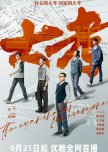
The Big Examination
10 personnes ont trouvé cette critique utile
When it rains, it pours.
At first glance, this is a tribute drama with low audience appeal. The topic of gaokao 高考 or national college entrance exams is already stress inducing. Throw in the pandemic and the average viewer would head for the hills. I snuck a peek because I like to keep an eye on Rong Zishan's growth as an actor. To my surprise, I was hooked from the first episode of this uplifting story about the resilience of youth in the face of great challenges.This drama is not about China's urban elite. It is set in Jinhe County, where most of the households are among the two thirds of Chinese households that are not part of the middle class. The pandemic disproportionately affected high school seniors from this class of Chinese society. Gaokao is a life changing rite of passage for them. All the hopes and dreams of their families are staked on their gaokao performance. With less resources and uneven access to the internet, online learning is less effective for many of them. The pandemic exacerbated the economic and social pressures these families were already experiencing. This drama offers some insight into why the Chinese leadership has clung to an extreme zero tolerance covid policy so different from the rest of the world.
The narrative focuses on five students of Jinhe County No 1 Middle School (Pan Xianxuan and Gao Mingyu) and Jinhe County No 4 Middle School (Zhou Bowen, Wu Jiajun and Tian Wenwen) and their principals Wang Benzhong and Shi Aihua. Because it is a small county, there are about three degrees of separation between the students, teachers, their families and the broader community. Bowen, Wenwen and Jiajun are fast friends at No 4 Middle School, where Bowen is the star pupil. He intensely disapproves of his deadbeat dad Zhao Meiren, who is charismatically portrayed by Wang Xiao. Wenwen is left to fend for herself after her grandmother passes away as her absentee parents run a business in Wuhan. And aspiring artist Jiajun suffers from the nightmare oversight of the ultimate tiger mom. They are part of an online student chat group with Pan Xianxuan and Gao Mingyu, students at the No 1 Middle School, which is a boarding school. My favorite character, Pan Xianxuan is a savvy and commercial doer who is not academic oriented. Despite his father's wealth, his is practically homeless as both his divorced parents have long moved on. And finally Gao Mingyu, the most impoverished and driven of them all whose only family is an ailing grandfather. They form a fast friendship and benefit from the care and affection of their principal Wang Benzhong, who is more like a surrogate parent to them both.
Every time I watch a drama with young actors matched up with veterans like Chen Baoguo, Wang Quanyuan and Wang Xiao,I am floored by the seamless and natural the performances all around. I feel fear for the current generation of popular actors whose flaws only become more obvious when they act across veterans because the next generation is growing up fast and there are lots of them. This cast made me invested in their stories from the get go and sharked me into enthusiastically watching a flag waving, sappy, inspirational story, the kind that I have a very small yearly quota for. The message of the story is very clear - often in life, when it rains, it pours but it is in times of hardship that we find our best selves.
While this story does carry some powerful and moving coming of age messages beyond surviving a pandemic, what I didn't like is it is a bit too good to be true. The pandemic turns every flawed character into a better version of themselves. The strong sense of community and the dedication and fighting spirit of parents and teachers can prevail over an amorphous enemy and natural disasters alike. Most of all, the pandemic didn't seem as isolating and as disruptive as it probably was and the government's pandemic control measures are portrayed as very mild. To be fair, this is not set in a densely populated community and it is during the first 200 days of 2020, during which China had effectively contained the outbreak to Wuhan. Nonetheless,, I feel there is a bit too much sugar coating and white washing in this drama that avoids the uglier, more realistic aspects of the pandemic and China's response to it. It also loses focus at times as a result of trying to acknowledge too many every day heroes from educators to health workers.
For a flag waving drama, this is a surprisingly good watch and the propaganda aspects are non intrusive. The youth aspects are well written and wonderfully portrayed. I am happy to rate this a very solid 7.5.
Cet avis était-il utile?
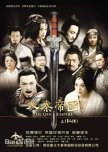
Divide and conquer.
Qin Empire 2 or Qin Alliance on Netflix is about Ying Si or King Huiwen of Qin who reigned from 338-311 BC. More than a century later, Ying Zheng or Qin Shihuangdi succeeded in unifying the Warring States(221 BC). In an interesting parallel, Ying Si was the first of the Dukes of Qin to name himself 王/Wang or King. His more well known descendent subsequently declared himself 皇帝/Huangdi or Emperor. I watched this out of order after completing Qin Dynasty Epic, which is Ying Zheng's story and the final installation of this four part series that doesn't have to be watched in order. This review is going to be short as there is an excellent comprehensive review by @Skibbies. I will try to avoid repetition and focus on incremental observations, especially on how this differs from the final season.What is most striking is that Ying Si really had it hard. When he came into power at eighteen, his father's clan and advisors were not fully behind him. And the Qin state was not especially powerful and existed in imminent danger of being swallowed by one of the other Warring States. Survival, much less ascendency was by no means a foregone conclusion. But Ying Si was a true conqueror - cunning, shrewd and utterly ferocious. Fu Dalong's masterful performance captures the remarkable indomitable spirit of the character and the sheer enormity and necessity of the task in front of him. This makes Ying Zheng, though so much more renown in history, seem like a lesser conqueror by comparison. For by then, Qin was already a superpower where the outcome was already inevitable.
The best parts of this drama are about how with the aid of his advisor and lifelong friend Zhang Yi, Ying Si was able to prevent five states from forming an alliance against Qin. They did this by some brilliantly crafted divide and conquer strategies that involved trickery, diplomacy and outright brutal and bloody warfare. Even though I was moved by Ying Si's deep relationship with Zhang Yi, I detested all of the so called genius strategists in this show, including Zhang Yi. I just could not stand their arrogance and sense of intellectual snobbery and how vile and evil these turds of history were. Their loyalty is not to king and country but can be bought by whoever could give them the most chess pieces to play with with little respect for the sanctity of life. To them, war is just a giant chess board where they can showcase their talent to the world. In the end Ying Si prevailed over all of them not because Zhang Yi was smarter or more loyal but because for Ying Si it was a battle for survival won by blood and sacrifice. His army would have gone to the ends of the earth for him because even while he took them to victory and glory, he truly felt the loss of and grieved for his fallen soldiers.
Even though I am sure it is heavily romanticized, I loved the portrayal of Ying Si's passionate and tempestuous relationship with the wild and wanton Empress Mi. What a woman! She lived life large, loved and hated and was at the end the bravest most loyal custodian of Ying Si's legacy. The drama lost momentum for me after Ying Si's death but the final two episodes where Empress Mi was both ruthless and compassionate at the same time ends this on a strong note.
While this production looks dated and lacks the aesthetic and cinematic appeal compared to more recent historical dramas, the acting of the main characters is top notch. The telling of the story overall, especially in the art of war is well done, not overly complex or difficult to follow. I could have done without knowing so much about Zhang Yi's personal life but there were some decent moments. This an 8.5 for me largely because I cannot praise enough how Fu Dalong's Ying Si is unforgettable and everything a Qin conqueror should be.
Cet avis était-il utile?

Dead men walking.
This year 2020 must be the year of detective stories, there are so many that we are spoiled for choice. This one set in the Republican era (1911) hooked me with its dark, eerie prologue that immediately invokes a hint of the supernatural and the presence of evil. Twenty years ago in Fuyuan County, twelve beheaded escorts are brought back to life via an ancient ritual. But the mystery of these dead men walking's murder and the whereabouts of their missing cargo is never solved. Fuyuan County remains a remote suburb of Tianjin that is steeped in dark magic and witchcraft.Tan Bodun is a rising young detective in with the Tianjin Police with a secret - he has a dark side that he struggles to suppress. Accompanied by his side kick Da Pan and his Westernized fiancée Luo Jiazhen, he is sent to the ominous Fuyuan County to solve another spooky and inexplicable murder that takes place in plain sight of the town's elite. On the way they stumble upon another case and encounter Song Chengmin, one of the scions of the affluent Song family. Aided by the local police inspector Zheng Jiewu, they pull at what appear to be disparate threads, more sinister murders occur and threads end up being linked and lead eventually to the unraveling of the twenty year old cold case.
What I really like about this drama is that the overarching mystery is well written and there are enough clues and suggestions along the way that when all is revealed, everything fits together and intuitively makes sense. Unfortunately I cannot say the same about the many sub-mysteries. As often is the problem with this genre, the writers tend to give in to the urge to write twists upon twists upon twists. After one or two times, this becomes confusing, tiresome and in some cases, the final solution is not the best, most convincing one. All of the main characters appear to have their own agendas and behave suspiciously enough to make viable suspects in the crimes. The problem is if they are not guilty these hidden motives are never fully explained, it is really done to create an illusion of probable cause.
Gao Zhiting is a really talented and likable young actor. I really enjoy his portrayal of Tan Bodun and his wickedly brilliant alter ego. In fact I much better like his alter ego but I don't really like that they went down the Dr Jekyll and Mr Hyde route with the character. It would have been cleaner and more interesting if they just wrote him as a truth seeker with unconventional or occasionally morally ambiguous methods. The rapport and team work between the main characters is very enjoyable and feels very natural; I find Da Pan in particular to be hilarious. However, I am not convinced by any of the romances and I really dislike how Jiazhen turns into a spoiled, willful and immature brat somewhere in the middle to just create some romantic angst.
Although the ending clearly paves the way for another season, as far as the overall conspiracy is concerned it is very satisfyingly resolved so I won't call it an open ending. I wouldn't mind watching this team work together again, in particular if the overall case is as well written as this one was. The only thing I don't like about the ending is that one of the key villains for Season 2 is already revealed as a hook. That was unnecessary and will take a bit of fun out of Season 2 but not so much so that to dissuade me from watching.
Overall, this is a very entertaining watch even though not all of the sub-mysteries are interesting. I really love the spooky, supernatural undertones and rate this an 7.5 for that.
Cet avis était-il utile?
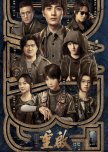
The thunder rolls: a work in progress
This is the first of this series that I managed to get this far through. Despite the appeal of supernatural mysteries and tomb raiding adventures, I was never able to get into any of the other ones. That said, while there are flashes of brilliance, the overall effort so far is at best mediocre with much hanging on how the various plot threads end up resolved.A cryptic message from Wuxie's uncle that sends the Iron Triangle - Wuxie, Pangzi and Zhang Qiling on a quest to decipher the message of the Thunder god and find Wu Sansheng. The story is off to an awesome start with heart stopping action and phenomenal world building. The scenes in the tomb have just the right balance of mystery, suspense, supernatural forces, hordes of foul and undead creatures and death defying moments. My eyes bugged out at Qiling (Huang Jun Jie)'s raw athleticism, fierce speed and fluid grace. Like most viewers, I love the Iron Triangle - their chemistry, hilarious banter and complimentary skills make them seem invincible together. So it is super disappointing to see the three amigos separate and off on their own.
The pacing is jarring - it alternates abruptly between gripping, life threatening action and mind numbingly boring and unnecessary filler episodes and characters. The entire Hei Yanjing/mute girl arc could have been cut by at least 75pct - there is little plot advancement and the romance is pedestrian. It could only have been worse if the girl can actually speak so thank the small mercies. That painful arc ends only to descend further into purgatory with the introduction of (drum roll) Piao Piao. While allegedly due to the heavy hand of censorship, at best she had three brain cells instead of two. Poor Panzi, he deserves so much better. It is offensive to see women written to be so dumb just to facillitate certain plot developments. By comparison, Xiao Bai is an adorable genius; even her lovesick eye batting at Wuxie is totally forgiveable considering how devastating and charismatic Zhu Yilong's Wuxie is. I am sure I will be unable to watch any other actor take on this role after this.
Although I quite like Warehouse 11, the Sea King's tomb is hard to beat and sequencing leaves Season 1 ending with an anti-climatic and unfinished feel to it. The reveals are somewhat predictable and too many plot threads are left open. If too much time passes before Season 2 airs, I will forget many of the important clues and open issues unless I invest in some rewatching. In hindsight, I should have started this after there is an airing date for Season 2 and that would be my advice for those planning to watch this.
Cet avis était-il utile?

Heavenly Sword and Dragon Slaying Sabre
12 personnes ont trouvé cette critique utile
The plot was lost somewhere along the road to redemption.
Heaven Sword is one of my all time favorite Jin Yong stories. While this 2019 adaption is overall done well and quite watchable, I am still disappointed because the story is so gripping and epic that properly executed it could have and should have been a 10. I feel that way about most of Jin Yong's stories and I am time and again disappointed with C-drama's inability to turn the gift of a fantastic storyline into a kick-ass 10.The first problem is that riding on the gift of a great storyline, the production team was very sloppy with the cast and the casting of the key roles. It was obvious from the start that many of the lead actors struggled to get into character: Zhang Cuisan and Zhao Min notably. And while I think Zeng Shunxi is a very promising young actor, at 21 he is too much of a boy still to fully pull off Wuji. He wasn't bad but his chemistry with both female leads was little more than warm and friendly. That's just not good enough as Wuji's two main love interests are bad-ass, devious and willful women; a handful for any man much less a boy. To make matters worse, they saddled him with the worst man bun that highlighted an unflattering roundness to his features - many times I thought the Pillsbury doughboy was going to burst right out of him! It wasn't till the much later episodes they fixed his look in a good way. In addition to the main leads, poor chemistry between the couples is a consistent theme throughout this show. Whoever paired up the actors must surely be the matchmaker from hell. The initial flat romance between Zhang Cuisan and Yin Susu almost made me give up on this early on but it somehow clicked once the fantastic child actor playing young Wuji was brought into the mix.
While it seems I will still have to wait for a version of this epic story with the A-list cast it deserves, some of the roles were played by quite strong performances (Yangsiu, Zhou Zhirou, Xie Xun, Song Qingsu) while the others were good enough (Wuji, Zhao Min) that the uninspired ones (Xiao Chao etc) were drowned out and it still came together well enough to be quite enjoyable. And the action was quite good although they went a little bit overboard with the slow motion that made the many good kung fu scenes a lot less exciting. While it is definitely technically much better polished than my best loved 1986 version, the A-list 1986 cast wins hands down when it comes to breathing life into the main characters.
While this version broadly sticks to the original storyline, it digresses meaningfully from it in a very subtle way. This is a more politically correct version that dials down the cruelty of many of the darker characters and deals with them compassionately, offering them a path to redemption. In the case of Song Qingsu, it was well done because he is just a weak character that strayed off the wrong path. But in the case of Zhou Zhirou, I really didn’t see the point – this is an ambitious, selfish and cruel character that is innately much more bad than good, it is fundamental to the plot. Zhu Xudan is an actress that is naturally blessed with a mal-contented expression – she would have been an even more brilliantly wicked Zhou Zhirou if they didn’t try to make her slightly nicer. But what was even more criminal was they kind of tuned down Zhao Min, one of my all time favorite Jin Yong heroines by making her less sassy towards the end to the point of being almost like the clingy and pathetically devoted Xiao Chao (yuck). It was as if they were flirting with the idea of a shock alternative ending where Wuji ends up with the Zhirou and then thankfully chickened out at the last minute. Two thumbs down is all that I can say. And they didn’t stop with Zhirou and Qingsu, they pretty much made excuses for and/or tried to make all the bad guys slightly less bad. Boring and tiresome after awhile and it had the overall impact of diluting the passion and vehemence of Jin Yong’s characters both good and evil.
Of course all of this greater focus on character development and whitewashing comes at the cost of extra time focus on unnecessary characters. But again, another travesty – there are so many C-dramas with shallow plots that are dragged out over 60 episodes but this really engrossing story was all squeezed into 50? The natural consequence of this was they just threw the whole plot under the bus. They cheated by counting on the fact this is a well known story - after all it is one of Jin Yong’s most popular works. So it rushes through many cursory character introductions and transitions that didn’t make the most sense that I would feel much sympathy for anyone who didn’t already know the story in advance. This entire epic tale that tragically spans so many lives and events over such a long time is brilliantly tied together by a grand conspiracy. The complicated plot unfolds around the unraveling of this conspiracy that among other things led to the misunderstanding between the sects and Wuji’s parents tragic deaths. All of that was pretty much lost because the production team deemed it more important to help us empathize with Zhou Zhirou? Really? It came at the cost of rushing through many key parts of uncovering the intrigue. At the end I happened to blink and almost even missed the entire denouement it was dealt with so almost dismissively. The scriptwriters did Jin Yong and us a grave injustice in this matter. Shame on the production team. Really.
Overall this was still a very polished effort but it didn’t really live up to the heart of Jin Yong’s epic story. While the plot was lost along the path to redemption, it is still very watchable and one of the better efforts out there. And it is still Jin Yong and that beats a lot of the no substantive storyline 2019 new dramas I have skimmed through so far (as of June 2019).
Cet avis était-il utile?
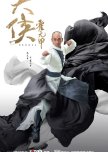
The Strong Man of Asia
Huo Yuanjia is a true blue real life martial arts hero right up there with Wong Fei-Hung, Fong Sai-yuk, Ip Man, Bruce Lee... they would all be top picks for my fantasy Shaolin soccer team! It is impossible to grow up without watching boat loads of kungfu shows about them. Even before I started this, I knew I must have already seen some permutation of it at least a gazillion times. And yet I still ate it all up like it was the first time; hovering anxiously for it to air every night and thrilled to my toes at every hair rising fight.Like most other accounts of this iconic and legendary figure's life, this drama clearly takes creative license with the truth in many places but overall, it still rhymes with the main figures and events that shaped Huo Yuanjia's life. Beyond all the typical martial world values and morality, this drama asks the question of whether standing up for one's beliefs and values is worth the heavy price and whether it is fair that family and friends become collateral damage. As a concession to the controversy surrounding his portrayal in Jet Li's Fearless, this drama emphasizes that Hua Yuanjia valued human life and did not kill indiscriminately which is more consistent with the philosophy underlying his famous Chin Woo Athletic Association that martial arts is practiced for keeping fit.
It goes without saying that this drama is extremely action intensive. And it is the kind of close up hand to hand combat that I really love with intense acrobatics and high impact flying kicks and punches aimed with devastating cruelty at internal organs. I don't have to sing praises for Zhao Wenxzhuo; nobody could better play this kind of intense action oriented martial arts role. I am a much bigger fan of his Wong Fei-hung than Jet Li's. There are lots of villains in this fast paced drama as Yuanjia's fame attracts as many enemies as friends. But the nasty Qing Mandarin Ying Si is just simply the most vile, fantastically dangerous villain I have seen in a long time and so convincingly acted that I loved to hate him.
As a life story, this is told chronologically and the action unavoidably climaxes in the middle and predictably builds to another peak at the end that underscores the message that Chinese can stand up against mismatched physical odds and show and the world not to underestimate the strong man of Asia. I have seen that David vs Goliath moment so many times and yet every time I am so satisfied I feel like belching loudly and thumping my chest.
What I love most about this drama is Huo Yuanjia's wife - Madam Wang whose given name is unknown (imagine they had five kids and no one even remembers her name!). She must be almost entirely fictionalized but nonetheless they made her completely awesome. She can't fight but she is so brave, loyal, gracious, forward looking and so clever she saves them multiple times. I also like that this Huo Yuanjia is far from perfect - he can be chauvinistic, patriotic, inflexible and overly conservative. How these flaws impact his relationship with his family, friends and disciples and how he experiences growth as he comes to understand and accept other points of views is very well articulated.
This is more than just another extremely well choreographed gratuitous martial arts action drama. It all gets wrapped into a story about an amazing life journey with many cherished companions, some who sadly are lost along the way. Even though it definitely feels very familiar and is at times even predictable, it is only in the best of ways. So if you are in the mood for some intense action and a trip down memory lane, this is a good choice, I give it a solid 8.0
Cet avis était-il utile?

The mind's eye.
Under the Skin is a police procedural that is built around the use of forensic art to solve cases. This fresh pitch within a well established genre is what makes this an interesting and fairly enjoyable watch.The drama opens with a classroom analysis of Jean-Louis David's "The Death of Marat", one of the most political and epochal masterpieces of the French Revolution. This beautiful lie of a painting that rearranges the crime scene and depicts the unsightly and radical Marat as a matyr makes the point that appearances can be deceiving. The assassin, feminist activist Charlotte Corday who in her own words, "killed one man to save a hundred thousand" is regarded as a heroine by many. It is clear inspiration for the drama's social commentary that highlights women's issues and the often empathetic portrayal of the perpetrators of the crimes. It is truly wonderful how carefully these recurring themes are woven into the cases and how deftly art is used to portray the distinction between first impressions, perception and different realities for different people.
This is all embodied in the mind's eye of genius artist Shen Yi, who is able to marry deductive observations from the scene and the nature of the crime with intuition to uncannily recreate images of the culprit, at times the victim and how it all went down. Tan Jianci is an actor I have kept an eye on for quite some time and I am excited to see him land lead roles. While he delivers a charming and nuanced articulation of this very reserved "still waters run deep" kind of character, it is not a role that best showcases the range and depth of his abilities as an actor. The real issue lies with the character blueprint itself, which is sad to say rather two dimensional. Shen Yi is simply too good to be true; beyond his artistic genius, he is also a master interrogator, chess player, indeed he is a jack of all skills required to solve the case. I am not quite sure what this elite Beijing Interpol team did without him. He is a loner with no real friends or family, has no vices or other flaws other than nodding off in cars either because he himself or Du Cheng is a snooze fest. Even though justice is blind in so many of the cases, he remains too unquestioningly a truth seeker and enforcer of the law. This is at odds with the many cases that conclude with a sense that the perpetrators were the true victims and it bothered me that it didn't bother Shen Yi.
Where Shen Yi is clearly the brains, Du Cheng is the muscle archetype; the man of action that takes stray bullets and runs into windows as and when needed. Yet like Shen Yi, Du Cheng is a likeable but ultimately hollow character with limited definition and development that comes very late in the game. The relationship between the two protagonist is so tentatively explored and inhibited that they barely make eye contact until we are in the final innings of the story. This is a shame because Tan Jianci and Jin Shijia share a very comfortable chemistry that the production did not fully take advantage of. I am left with a dissatisfied feeling of having been told rather than shown how the unbreakable bond of friendship and trust builds between them. The main antagonist is another shallow and uninteresting character who becomes pretty obvious well before the reveal even though their motive is unfathomable to the point of making no sense. It is fair to say that the characters in this drama are very much like Shen Yi's sketches; they are just nice outlines that lack dimension, colour, weight and substance.
It can be argued that two dimensional characters are par for the course in good, meaty plot driven dramas but unfortunately the plot is where this drama disappoints the most. Even though I appreciate the empathetic spotlight on current social issues, the cases or sub-plots are hit or miss and they don't deepen the main plot. There are only two solid, tightly wrapped up cases that I found very enjoyable. The other cases are rather predictable, had logic flaws and often don't wrap up the issues raised in a satisfactory manner. As for the main plot, the best part of it is how ingeniously the villain is trapped. The mastermind's involvement in the 7-year cold case that brings Shen Yi and Du Cheng together is frankly ridiculous. They were too successful very early on in a very lucrative field to need to engage in such a risky, difficult and time consuming business. There are at least two other potential masterminds, each of which would have made for much more convincing villains in terms of motive, means and opportunity. I feel the finale's message simply panders to the Chinese government's recent data privacy paranoia and crackdown on a big industry.
I can tell that a lot of research and meticulous attention to detail went into the procedural aspects of this drama and setting and artistic aesthetics are phenomenal. Even though the stage is set with amazing props and really nice camerawork, the overall impression is bland. There are no larger than life characters or relationships that will rock your world. There is no tension, no conflict, no suspense build up, the drama doesn't really peak it is just monotone throughout. That said it has some unique aspects and it is well made enough to be a good way to pass some time. I rate it a solid but ultimately forgettable 8/10.
Cet avis était-il utile?


 52
52 182
182 8
8

















